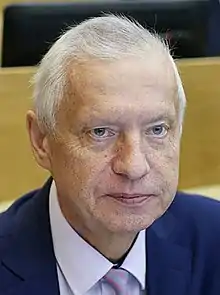Nikolay Kovalyov (politician)
Nikolay Dmitrievich Kovalyov (Russian: Николай Дмитриевич Ковалёв; 6 August 1949 – 5 April 2019)[1] was a Russian politician and member of the State Duma, where he chaired the Duma's Veterans' Committee. Kovalyov was the Director of the FSB from July 1996 to July 1998, when he was succeeded by Vladimir Putin.
Nikolay Kovalyov | |
|---|---|
 | |
| Member of the State Duma | |
| In office 18 January 2000 – 5 April 2019 | |
| Director of the Federal Security Service | |
| In office 20 June 1996 – 25 July 1998 | |
| President | Boris Yeltsin |
| Preceded by | Mikhail Barsukov |
| Succeeded by | Vladimir Putin |
| Personal details | |
| Born | Nikolay Dmitrievich Kovalyov 6 August 1949 Moscow, Russian SFSR, Soviet Union |
| Died | 5 April 2019 (aged 69) Moscow, Russia |
| Nationality | Russian |
| Political party | United Russia |
| Alma mater | MIEM |
Biography
Nikolay Kovalyov joined the KGB in 1974.[2] He was appointed General of the Army in 1997. In 1999 he was elected a deputy to the State Duma of the Russian Federation.[2]
He said in 1996: "There has never been such a number of spies arrested by us since the time when German agents were sent in during the years of World War II."[3] He also publicly speculated that Boris Berezovsky might be involved in the death of Alexander Litvinenko.[4]
During the Bronze Soldier Controversy in 2007, Kovalyov led a "fact finding mission" to Estonia, where the authorities were relocating a World War II memorial, including a two meter tall bronze soldier in a Soviet uniform.[5] Before leaving Moscow, Kovalyov asked Estonia's government to step down.[6] The two-day visit by the Russian fact finding delegatíon, originally set up to defuse a diplomatic dispute over the Bronze Soldier statue, only appeared to have escalated the feud, with the Estonian foreign minister and other Government officials refusing to meet with Kovalyov's delegation.[7][8]
Honours and awards
- Order of Merit for the Fatherland;
- 3rd (20 April 2006) for outstanding contribution to law-making and long-term diligent work
- 4th class
- Order of Military Merit[9]
- Order of the Red Star
- Medal for Merits in perpetuating the memory of the fallen defenders of the Fatherland (Russian Ministry of Defence, 2008) for his great personal contribution to the commemoration of the fallen defenders of the Fatherland, the establishment of names of the dead and the fate of missing servicemen, displaying high moral and business qualities, diligence and intelligent initiative, to assist in the task of perpetuating the memory of the fallen defenders of the Fatherland
- Diploma of the Russian Federation President (9 January 2010) for services in legislative activities and the development of Russian parliamentarism
References
- "State Duma lawmaker, former FSB head Nikolay Kovalyov dies aged 69". TASS. 6 April 2019. Retrieved 6 April 2019.
- "Ковалев Николай Дмитриевич" [Kovalev Nikolay Dmitrievich] (in Russian). Агентура (Agentura). Archived from the original on 12 March 2001. Retrieved 8 January 2021.
- "Counterintelligence Cases". Global Security. Archived from the original on 29 November 2020. Retrieved 8 January 2021.
- "Who orchestrated the plan to discredit Russia?" (in Russian). Kommersant. 2006-11-25. Retrieved 2006-11-26. Computer translation.
- Российские парламентарии призвали эстонский парламент дать оценку деятельности правительства республики (Russian parliamentarians urged the Estonian parliament to assess the activities of the Government of the Republic) Archived 2007-09-30 at the Wayback Machine Interfax, April 30, 2007. Retrieved: 2007-04-30
- Николай Ковалев: эстонское правительство должно уйти в отставку (Nikolai Kovalyov: Estonian government must resign)
- "Estonian Ministry of Foreign Affairs Press Release". Archived from the original on 2007-05-03. Retrieved 2007-05-02.
- Estonia Cancels Russia Talks Over Statue, by Jari Tanner, Associated Press, May 2, 2007. Retrieved: 2007-05-02.
- Умер депутат Госдумы Николай Ковалёв // TASS
External links
| Preceded by Mikhail Barsukov |
Director of FSB July 9, 1996 – July 25, 1998 |
Succeeded by Vladimir Putin |